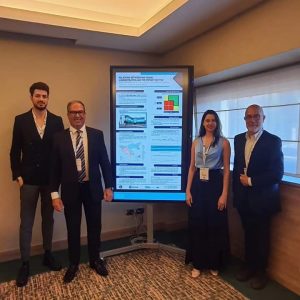O mês de fevereiro foi marcado por defesas de mestrandos e doutorandos do CESS/COPPEAD. No total, dois mestrandos e um doutorando estiveram defendendo suas respectivas dissertações e tese nas últimas duas semanas. Confira abaixo um pouco sobre cada trabalho levado à banca:
Msc. Olavo Diogo

O doutorando e pesquisador do CESS, Msc. Olavo Diogo, defendeu sua tese intitulada “SOLVING DISTRICTING, SCHEDULING AND ROUTING PROBLEMS IN PRIMARY HEALTH CARE: a study applied to Family Clinics in Brazil”, no dia 19 de fevereiro de 2019.

Os cuidados primários de saúde no Brasil são providos por unidades básicas de saúde que atendem proativamente a um território adscrito. Essas unidades no Rio de Janeiro são chamadas de Clínicas da Família. Seus agentes comunitários de saúde (ACSs) são responsáveis pela visitação aos domicílios no território para inicialmente cadastrar os membros de cada família e, posteriormente, monitorar seus estados de saúde, bem como promover a saúde e prevenir doenças. Dependendo do nível de risco e vulnerabilidade dessas famílias, as visitas devem ser mais ou menos frequentes, estabelecendo assim prioridades. Atualmente, os procedimentos para determinar as áreas de serviço para cada ACS, o agendamento de visitas e o roteamento desses profissionais são feitos de forma manual. Assim sendo, a cobertura não é alcançada de forma satisfatória, com a visitação mensal de todas as famílias, respeitando suas prioridades. Quando isso acontece, é caracterizado um Problema de Alinhamento de Território. Esta tese pretende apresentar modelos automatizados para a solução desse problema, incluindo os processos de distritamento, agendamento e roteirização de ACSs de uma Clínica da Família em seu território. Inicialmente, por meio de um estudo bibliométrico longitudinal, este trabalho investiga modelos matemáticos para resolver o Problema de Alinhamento de Território. A metodologia utilizada engloba três áreas de análise: rede social de autores, análise longitudinal de palavras-chave e mudança de mapeamento. Para destacar as mudanças significativas ao longo do tempo das redes de palavras-chave, um diagrama aluvial é usado para mostrar os agrupamentos de significância através dos subperíodos estudados. Neste ponto, o trabalho relata os autores mais relevantes sobre o assunto e os modelos matemáticos mais utilizados para resolver o problema. Em uma segunda etapa, o trabalho investiga métodos para resolver problemas de distritamento. As técnicas mais utilizadas para resolver a questão são identificadas. Uma dessas técnicas é aplicada para analisar sua adequação a um caso real. Por fim, o trabalho apresenta um modelo automatizado para o problema de agendamento e roteirização de ACSs. Sugere-se uma solução baseada no Problema de Roteirização de Veículos com Prioridade de Serviço (PVRP-SP). Um algoritmo foi desenvolvido em R para implementar o método de solução, e uma heurística clássica para VRP Capacitado (CVRP) foi usada como sub-rotina de roteirização. Como contribuições, este trabalho mostra pela primeira vez o uso concatenado das três técnicas de análise bibliométrica e inova com modificações factíveis na análise de mudança de mapeamento aplicada a pequenas redes. Para o processo de distritamento, o algoritmo proposto em R requer poucas etapas para a solução inicial, e o mecanismo de busca local (tabuSearch) contribui para um tempo de computação curto. Para os problemas de agendamento e roteirização, resultados encontrados
Md Mafuzul

O mestrando Md Mafuzul defendeu sua dissertação “Non-Clinical Perspectives of Polypharmacy”, no dia 18 de fevereiro de 2019.

Today healthcare costs are following an upward trend. In containing those rising costs, one approach is to maximize outcomes or value for patients. In health care, patients’ value depends not only on clinical therapies but also on several non-clinical perspectives, which define whether clinical therapies are going to be beneficiary or problematic. Recently, healthcare research has emphasized to explore non-clinical perspectives in care processes. This research explored non-clinical perspectives of polypharmacy through some patients’ and physicians’ participation. Polypharmacy refers to the simultaneous use of multiple medications and is called necessary evil because of its association with several adverse consequences such as adverse drug events, drug-drug interactions, poor medication adherence, and additional health service expenditure. This research aimed to illustrate how physicians can reduce cases of polypharmacy or help patients in dealing with the adverse effects of this condition by focusing on non-clinical perspectives of polypharmacy. In this context, this research answered three specific questions: how patients experience consequences of polypharmacy; what causes polypharmacy; and what interventions should be appropriate to manage polypharmacy. This research collected qualitative data only, using a phenomenological approach. The unit of analysis was patients and physicians. The data were collected conducting in-depth naturalistic interviews with structured open-ended questionnaires. In analyzing the data, this research sought a comparative approach, in which the findings of this research have been compared to the findings in the literature. This research found that several non-clinical factors cause polypharmacy and trigger problematic phenomena in polypharmacy. Accordingly, several interventions that targeted those factors were proposed. Those interventions will likely add value for patients who are in polypharmacy or who are likely to experience polypharmacy. The added value will prevent some potential costs related to the utilization of additional health services and improve the care management process for patients in polypharmacy.
Keywords: Healthcare, Polypharmacy, Non-Clinical Perspective, Value for Patients, and Participation.
Álvaro Figueiredo

O mestrando Álvaro Figueiredo defendeu sua dissertação “THE APPLICATION OF LEAN PHILOSOPHY IN THE MANAGEMENT OF ELDERLY PATIENTS BY HEALTH INSURANCE COMPANIES: A CASE STUDY”, no dia 26 de fevereiro de 2019.

In the context of the rising healthcare costs and the ageing of the population in Brazil, the objective of this dissertation is to understand how lean philosophy principles can be applied in the management of elderly patients by health insurance companies. Currently, Brazil has a significant portion of its population insured by private healthcare companies, which haven`t been willing to create health insurance products for the elderly segment of the population. On the other hand, the demand for healthcare for the elderly has been growing as the Brazilian population has been ageing rapidly. Although there has been research regarding lean thinking applied to healthcare in Brazil, there haven’t been studies applying it to the management of elderly patients. In order to look for a solution for the complex problem of the rise in the healthcare costs and growth in the elderly population, while filling this gap in the literature, this research has investigated how the lean principles from Womack and Jones (1996) can be applied in the management of this older public through a case study in one Brazilian health insurance company based in São Paulo. This company was chosen because it is an exception in the industry as most of its clients are elderly and have individual insurance plans. Additionally, this company has been adopting lean thinking techniques on its operation with the support of its CEO. This case study has been constructed mostly through interviews with these company’s employees. In these conversations, these employees were able to describe the implementation of lean principles in the company and their perception regarding the benefits and the problems that their adoption can bring. This study concluded that lean thinking principles can be applied in the management of elderly patients by these companies as these principles generally increase the value of the service delivered to the elderly patient while maintaining costs under control and insurance premia affordable.
Keywords: Lean Thinking, Lean Healthcare and Elderly.



